- Home
- Steven Brust
Sethra Lavode (Viscount of Adrilankha) Page 20
Sethra Lavode (Viscount of Adrilankha) Read online
Page 20
Alas, having once set foot into the dim corridors of the mountain, he lost not only his way, but his exact punctuality (the latter being a direct consequence of the former), it taking him some fifteen or twenty minutes of making the exact wrong turnings and so avoiding both the correct corridor, and the industrious Tukko who had been sent to look for him.
Eventually, however, he was found and escorted to the room where were seated Sethra Lavode, Sethra the Younger, the Sorceress in Green, Khaavren, the Necromancer, Lord Brimford—that is, the Warlock—and a few Dragonlords he did not then recognize. Morrolan mumbled an apology which was politely brushed aside, and he took his place at the long, smooth, brightly polished table made of stone that looked as if it, like much of the rest of Sethra’s home, had once been part of the mountain.
“We had not gotten very far,” said Sethra. She pointed to a large map of Adrilankha that hung on the nearest wall, and said, “I was merely pointing out the positions from which I intend to defend the city.”
“Very good,” said Morrolan. “I shall give you my whole attention, I promise.”
Sethra took a moment to introduce Morrolan to those of her staff officers whom he had not yet had the honor of meeting, after which she outlined her plans for engaging the enemy. “Once we know for certain where he intends the attack,” she said, “we will, of course, move forces there as quickly as possible. If you study the thin lines on the map, you will observe that they indicate the best routes from one position to another. You must memorize those roads, and even journey along them once or twice, so that there will be no mistakes if you need to move your divisions. I have already arranged with Khaavren, Captain of the Phoenix Guards, for small patrols to keep those routes empty. For my part, I will make my headquarters in the field, whereever I feel I am most needed. But I caution you all to be prepared for the unexpected.”
“Do you know,” observed Khaavren, “I have often heard that one ought to be prepared for the unexpected, but I am not entirely certain of how to do so.”
“Well, sir,” said the Warlord at once, “that is because there is no good way to accomplish this. But the caution must nevertheless be given, for the simple reason that if it is not, and something unexpected happens, I should not look nearly so wise had I not made the remark.”
There were a few chuckles over this display of wit, and Khaavren, for his part, nodded to show that he held himself answered.
“However,” continued the Enchantress, looking carefully at everyone present in turn, so that each should realize that, in what she was about to say, there would be no question of joking, “however much I may, and, indeed, do insist upon a regular military plan in order to fight off this invasion, I cannot help but believe that there will be a great deal more to this battle than we expect. That is why the warlock Brimford,” here she indicated the Easterner, “is preparing, as he did before, to see that the enemy is attacked by whatever wildlife can be pulled from the surrounding jungles and forests. It is why the Necromancer—” here she nodded to the pale demon, “—intends to reanimate any of the enemy who should be killed in the battle. It is why I intend to make as great a use of sorcery as ever we can manage. There will be much that must necessarily be left to decisions made in the moment, because of how little we know; we ought, therefore, to be as certain as we can about what is ours to control, and that, above all, includes our military forces.”
“For all the good they will do,” observed Sethra the Younger, shrugging.
Morrolan looked at her, then at the Warlord.
“My apprentice,” explained the Enchantress in answer to Morrolan’s look, “is convinced that the battle will be decided entirely by how we respond to whatever schemes our enemy may have concocted. In this I believe she may well be right but, as I have said, that is no reason to ignore the direct, simple forces that are about to attack us.”
“How,” said Morrolan, “you agree with her?”
“I have believed for some time that Kâna has certain plans and stratagems with which he hopes and expects to overcome our advantages. I have had no reason to change my mind—indeed, I have reason now to think so more than ever.”
“Well, but—” He stopped then, and a certain flush rose to his face as he looked at the others at the table.
“No, go on, my friend,” said the Warlord. “Now is the time to speak freely. To-morrow morning, unless I am much mistaken, it will be time for you to follow orders without question.”
“Well then, I was merely about to express my curiosity about what these new reasons are.”
“Oh, as to that. Well, I have some small indication that Kâna may have enlisted the aid of a certain Tri’nagore, one of the Lords of—”
“Tri’nagore!” cried Morrolan.
“How, you know of him?”
“Nearly.”
“Well, come then. Tell us what you know.”
“You wish to hear about Tri’nagore?” asked Morrolan, obviously agitated to a greater degree than any of them had seen before.
“Certainly,” said Sethra Lavode. “And at once, if you please.”
“He is worshiped by barbarians near Blackchapel—that is, near the village where I lived before coming here. Near, but not too near—a day’s ride, perhaps.”
“Barbarians?” said Sethra Lavode, as if unsure how he was using the term.
“Barbarians?” echoed Sethra the Younger, as if wondering how this could be true of some Easterners more than others.
Morrolan continued speaking, with barely contained fury. “They attacked my village for no reason, except, perhaps, to appease this fetid-breathed evil-eyed cat-eating mucklord of a god they worship as who should say kethna worship the filth of the farmyard. Not for gold, nor food, nor wine, nor even desperation for congress, but only for blood did they fall upon us, while I was meditating, and unaware until it was over and saw what had been done by the hand of this … Tri’nagore.”
He uttered this last name as if it were a stronger curse than any he had used leading up to it, after which he fell silent, as did everyone else at the table, until, after some period of time, the Warlord said, “My goodness.”
Morrolan shrugged and glowered at the table in front of him.
“And yet,” ventured Sethra the Younger after another moment, “I had thought that Tri’nagore desired sacrifices from his own followers, not those of others.”
“Bah. He doesn’t care. He desires blood, that is all. These barbarians live in villages that always run with blood—human, animal, they don’t care. In one of the villages is an altar where they raise his presence—they drench it with blood to appease him. They raid and plunder because their god tells them to, and so they worship a god who tells them to plunder instead of raising food as man was intended to do.”
“I thought you said,” remarked someone, “that they didn’t steal food.”
“No, I did not,” said Morrolan coldly. “I said that was not why they raided. That doesn’t mean they do not carry off what they can.”
“But then,” said the Dragonlord, “if it were not for the plunder, well, I do not understand.” He fell silent.
Morrolan said, “Well, if truth be known, I do not understand myself. Nor even does Arra, who knows them better than I do.”
“Who is Arra,” asked another Dragonlord.
“My high priestess, and the head of my Circle of Witches.”
“Ah, witches,” said the Sorceress in Green contemptuously.
“And there you have your answer,” said the Warlock, speaking for the first time.
Suddenly all eyes were upon him.
“Explain yourself, sir,” said the Warlord, and if anyone objected to her referring to the Easterner as sir, at least no one thought to correct Sethra Lavode.
“Tri’nagore,” said Brimford, “is a god of witches. If, indeed, Kâna has a made a pact with him, and if, moreover, he has been manifested by these barbarians of whom the Lord Morrolan has done us the honor to speak, well, then we mi
ght guess that my arts will be ineffective.”
The Enchantress nodded slowly. “That, then, must be part of the Pretender’s plan. Can he also interfere with the Necromancer?”
The Warlock shrugged. “I would think not, but I know little of the gods, and less of necromancy.”
“What can be done?” asked Khaavren from the far end of the table.
“Ah, that is easy to answer,” said Brimford.
“Well?”
“The god must be banished.”
“Very well,” said the Sorceress in Green. “I accept that he must be banished.”
“And you are right to,” said Brimford. “But, how can this be done?”
“That is not easy to answer,” said Brimford.
Morrolan suddenly rose to his feet and, flipping back his cloak, drew his sword. We need hardly explain the effect on all of those present when this weapon was brought forth—there was a sound as everyone drew in his breath at the same moment, and everyone except Sethra Lavode flinched. And, lest there be any mistake, Morrolan set it upon the table, where it echoed harsh and loud on meeting the stone, so they could all look upon it, and he said, “As to that—I will banish him.”
“You?” cried the others.
“I have said so, and I even repeat it. I will banish him.”
Sethra Lavode nodded slowly. “What help do you require?”
“None,” said Morrolan. “Everything that concerns this god I take upon myself.”
“And yet,” said the Sorceress in Green, “we expect the dance to begin to-morrow at dawn.”
“In that case,” said Morrolan, picking up his sword and sheathing it, “I will nominate Fentor to take my place, and, moreover—”
“Well?”
“I should be on my way. Warlord, do I have your leave to attend to this matter?”
Sethra Lavode studied the young Dragonlord, and appeared to be reflecting. Then she said, “Very well. Your lieutenant will command your troops. You have my leave, and my blessing on your mission.”
Morrolan bowed, and, without another word, walked out of the room.
Chapter the Eighty-Fifth
How Morrolan Returned to the East
In Order to Settle an Old Score
Morrolan made no particular arrangements before setting off on his mission; indeed, he made no arrangements at all. He walked out of Dzur Mountain and took in great lungfuls of the clear mountain air in order to settle his mind—he was just calm enough to know that he ought not to attempt a teleport while so furious that he could not focus his thoughts. Bringing himself to a state where he might safely perform this exacting spell took, in fact, rather a long time: as he stood there, doing nothing, he would remember again the attack on Blackchapel, and again he would work himself into a passion. He paced and kicked at stones, sometimes even bending down to pick one up and throw it, hearing the clatter down the slope. Sometimes he would slap his hand onto the smooth, black pommel of his sword. Sometimes he would stand, his arms folded over his chest, and simply fume, letting his rage carry him as it would.
Eventually, his thoughts drifted to his home—still new enough to give delight—and these thoughts gave him a certain degree of satisfaction. He had not the traditional nobleman’s mistrust of anything new, first because he was young, and second because he had been raised far away from the Empire and its traditions, and so had not had the opportunity to learn that older is invariably better. And so he reflected with sincere pleasure on his home, recalling its marble and obsidian, and thinking about improvements he might make.
Next, he mentally went through the convolutions of certain spells that had been his most recent study, and he thought about the upcoming battle, and the compliment he had been paid by Sethra Lavode—from whom a compliment had meaning if it had meaning from anyone.
After that, he thought about his Circle of Witches, now strong enough so that keeping the castle in the air was routine, automatic, and required only the least supervision from Arra, who instead could devote the energies to her two interests: studying the nature of witchcraft, and continuing prayers to the Demon Goddess. Neither of these, we realize, are of much practical use, but if we indicated that Arra was of a pragmatical character, we have been wrong to do so, and so we therefore tender our apologies.
Presently, he realized that he could safely manage a teleport.
His focus on Blackchapel was remarkably easy—he had only begun, and instantly it brought itself to his mind, so that the accomplishment of the teleport was, in fact, carried off without difficulty. The first thing that he noticed was the abrupt change in temperature: whereas Dzur Mountain had been chilly, even cold, here it was rather warm, although a certain refreshing breeze came off the Thundering Lake, with the freshwater smell that he had been unaware of missing until it reached him once more. In appearance, the inside of the chapel, which was unoccupied when he appeared there, was little changed from when he had last seen it. That it was still in use could be seen by the lack of cobwebs and dust, and there were, perhaps, a few more cracks in some of the benches and other woodwork, but for all of that it looked very much the same.
Morrolan stepped out of the chapel and onto the street that, although it had no official name (that is, there were no signposts, and, indeed, nowhere in the world was there a map of the village), was known as Chapel Road, and he at once had to use his hand to shade his eyes against the terrible luminescence that he had all but forgotten in the few years since he had been in the East. He remained there, blinking in the light, until, in a matter of a few seconds or minutes, his eyes had made an adjustment to the brightness and he felt that he could safely negotiate the street.
Two steps brought him to a place between the dry goods store and the silk merchant’s, both of which, he was pleased to see, had been rebuilt since he left. Once there, we should add, he was at once recognized. Indeed, in only a few moments, he was surrounded by townsfolk and facing a barrage of questions: How was Arra? Had the elfs killed everyone but him? Was he under a curse yet? Had he learned to speak foreign? Was he coming home? And countless questions about certain of his Circle, usually from someone who had strong feelings for this or that witch. But above all, he was aware that they were glad to see him, and so glad that, in spite of the cold venom that filled his heart, he found himself touched by their expressions of friendship, not unmixed with a certain reverence. And, in spite of his hurry, he could not but take a moment to speak with some of those he had known. Everyone was well—indeed, flourishing. There had been no curse, and no, he was not coming home. What was he doing in the land of the elfs? As to that, he did not choose to say except that he was learning many things, but—was there a horse he might purchase? A fast horse, as fast as can be.
A horse? But why did he wish a horse?
Because, he explained, there were certain heathen barbarians who required to be taught a lesson, and to-day was the day upon which it would happen.
This announcement, which he made with tolerable coolness, was greeted by stunned silence.
“You cannot mean it,” said someone.
“I assure you,” he replied. “I have never been more serious in my life. Indeed, leaving without having finished that little affair was more difficult than I can say. You remember that, when I left, they had just razed the entire village.”
“And they came back,” he was told, “just a few days after you left.”
“How, they came back?”
“Nearly,” said someone else. “And they burned down everything we had started to rebuild. And a score of us were killed, and I don’t know how many injured. I, myself,” added the speaker, “received such a cut across my back that I still bear the scar.”
“And since then?” said Morrolan.
“Oh, they learned that you had left, and they have not been back since.”
“Well,” said the Dragonlord, “they will have no need to search for me; on the contrary, I will be easy enough to find.”
“But, have you a
n army?”
“Yes,” said Morrolan. “Here, at my side.” With this, he touched the hilt of his sword.
The villagers looked at the sword, and even through its sheath seemed to feel it—there was, therefore, no answer to Morrolan’s observation.
“Now,” he said, “who can tell me how to find them?”
“Oh, that is easy enough. They live in four villages, forty miles away following the shore of the Thundering Lake. The first of these villages can be identified by a double row of sycamore trees lining its main street as you enter. It is, to be sure, something of a ride.”
“Something of a ride? Then, as I said, I need a good horse. Forty miles is a tolerably long distance, and I need to be there to-morrow.”
He was brought—very nearly forced by the press of the crowd, which now numbered some thirty or thirty-five—to the livery stable, where an argument was promptly begun. Whatever differences there may be between human and Easterner—and the reader knows very well how numerous and profound these differences are—in one way at least we are similar: the Easterner is as little inclined as the human to admit to anyone that his horse is second-best to another.
“Fast? Why, yes, you have a fast horse, but His Lordship wishes to travel more than half a league, by which time your horse will have run himself to death.”
“How can you stand there and lie in that fashion? Moreover, what horse would you recommend? That half-mule of yours? Bah, you would give His Lordship a horse with such a mouth, a horse that will twist and throw him on a whim, and will need to be fought every step to merely go in the right direction?”
“Then mine, here! Take mine. Why, he can run all day and night and be ready for a day’s work to-morrow.”
“That horse? Oh, you cannot insult him by offering His Lordship that nag with his head below his knees and tail ever drooping; why, she will die of old age before leaving the village—it is a wonder that she has not died in her stall.”

 Phoenix
Phoenix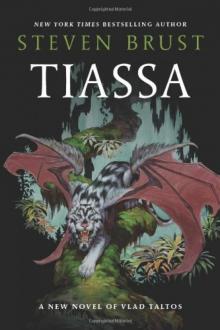 Tiassa
Tiassa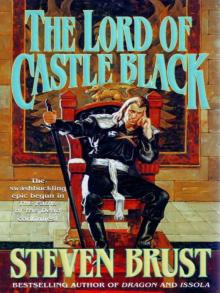 The Lord of Castle Black
The Lord of Castle Black To Reign in Hell: A Novel
To Reign in Hell: A Novel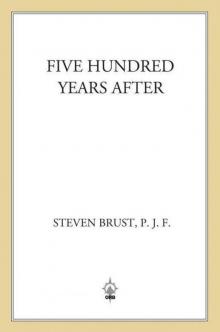 Five Hundred Years After (Phoenix Guards)
Five Hundred Years After (Phoenix Guards)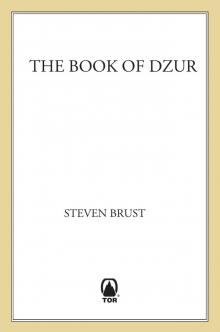 The Book of Dzur: Dzur ; Jhegaala
The Book of Dzur: Dzur ; Jhegaala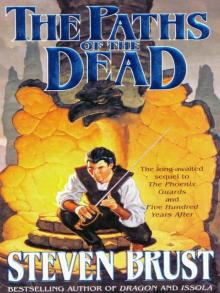 The Paths of the Dead
The Paths of the Dead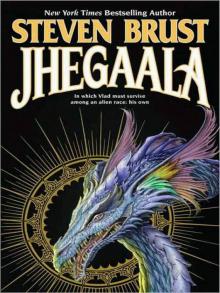 Jhegaala
Jhegaala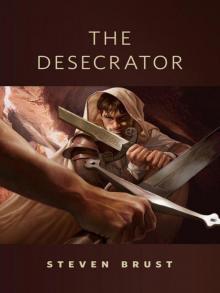 The Desecrator: A Tor.com Original
The Desecrator: A Tor.com Original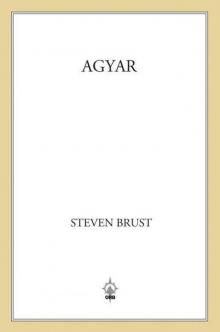 Agyar
Agyar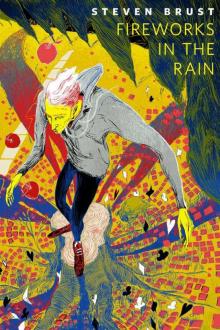 Fireworks in the Rain
Fireworks in the Rain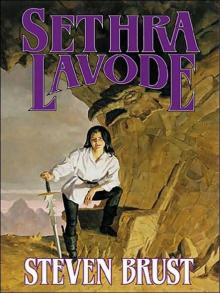 Sethra Lavode
Sethra Lavode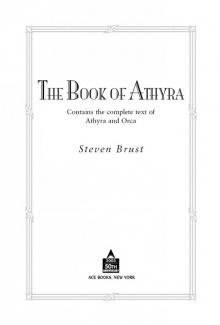 The Book of Athyra
The Book of Athyra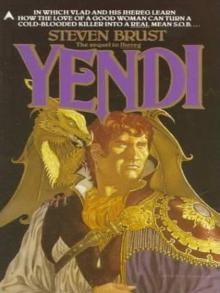 Yendi
Yendi Good Guys
Good Guys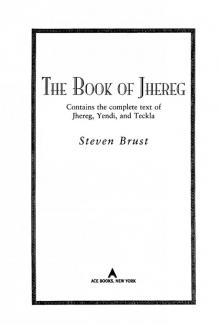 The Book of Jhereg
The Book of Jhereg Cowboy Feng's Space Bar and Grille
Cowboy Feng's Space Bar and Grille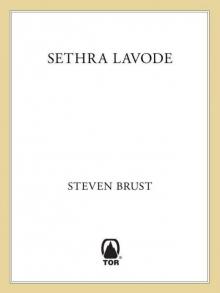 Sethra Lavode (Viscount of Adrilankha)
Sethra Lavode (Viscount of Adrilankha) My Own Kind of Freedom
My Own Kind of Freedom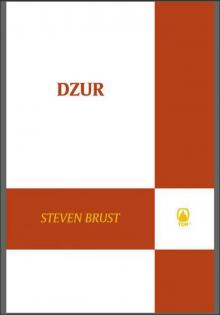 Dzur (Vlad Taltos)
Dzur (Vlad Taltos)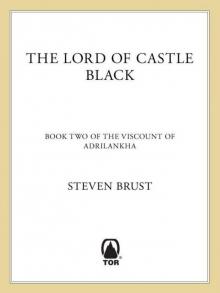 The Lord of Castle Black: Book Two of the Viscount of Adrilankha
The Lord of Castle Black: Book Two of the Viscount of Adrilankha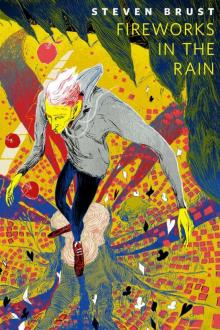 Fireworks in the Rain: A Tor.Com Original
Fireworks in the Rain: A Tor.Com Original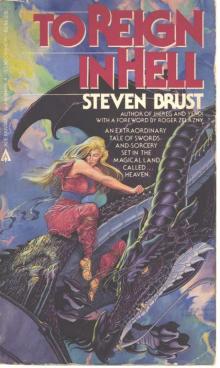 To Reign In Hell
To Reign In Hell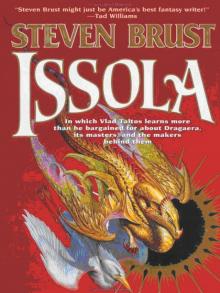 Issola
Issola Orca
Orca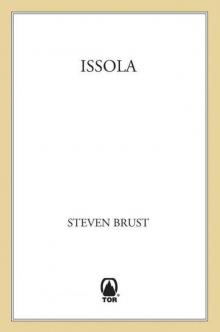 Issola (Vlad Taltos)
Issola (Vlad Taltos)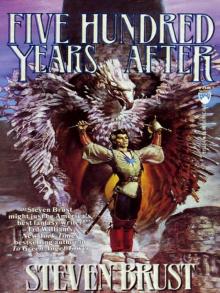 Five Hundred Years After
Five Hundred Years After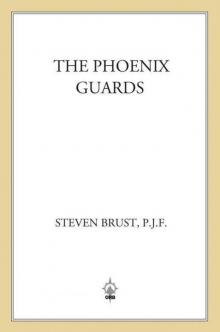 The Phoenix Guards
The Phoenix Guards Taltos
Taltos![[Vlad Taltos 06] Athyra Read online](http://i1.bookreadfree.com/i1/03/24/[vlad_taltos_06]_athyra_preview.jpg) [Vlad Taltos 06] Athyra
[Vlad Taltos 06] Athyra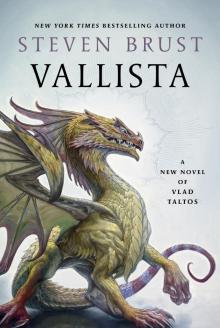 Vallista--A Novel of Vlad Taltos
Vallista--A Novel of Vlad Taltos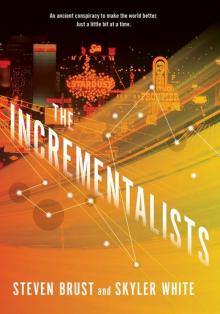 The Incrementalists
The Incrementalists![[Vlad Taltos 04] Taltos Read online](http://i1.bookreadfree.com/i/03/24/[vlad_taltos_04]_taltos_preview.jpg) [Vlad Taltos 04] Taltos
[Vlad Taltos 04] Taltos![[Vlad Taltos 03] Teckla (v 1.1) Read online](http://i1.bookreadfree.com/i1/03/27/[vlad_taltos_03]_teckla_v_1_1_preview.jpg) [Vlad Taltos 03] Teckla (v 1.1)
[Vlad Taltos 03] Teckla (v 1.1)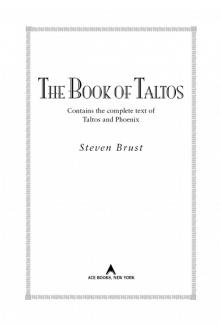 The Book of Taltos
The Book of Taltos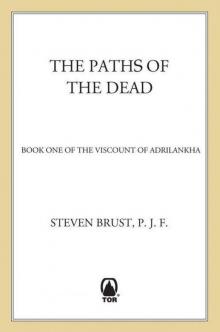 The Paths of the Dead (Viscount of Adrilankha)
The Paths of the Dead (Viscount of Adrilankha) Jhegaala (Vlad Taltos)
Jhegaala (Vlad Taltos)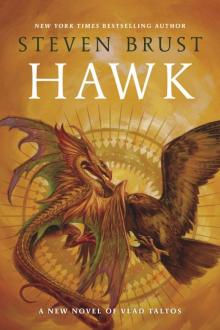 Hawk (Vlad)
Hawk (Vlad)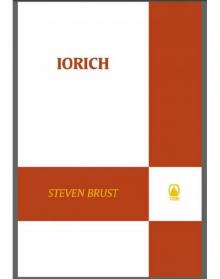 Iorich
Iorich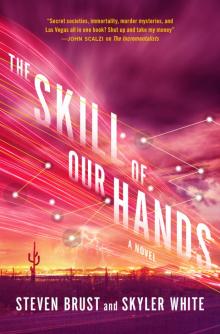 The Skill of Our Hands--A Novel
The Skill of Our Hands--A Novel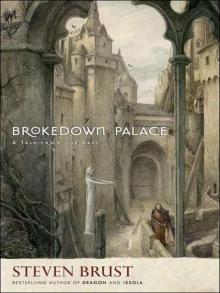 Brokedown Palace
Brokedown Palace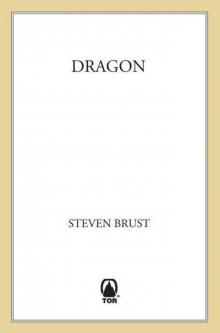 Dragon (Vlad Taltos)
Dragon (Vlad Taltos) Dragon
Dragon Athyra
Athyra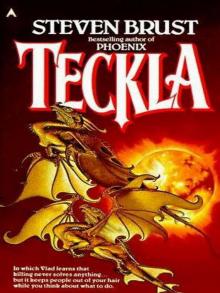 Teckla
Teckla Dzur
Dzur